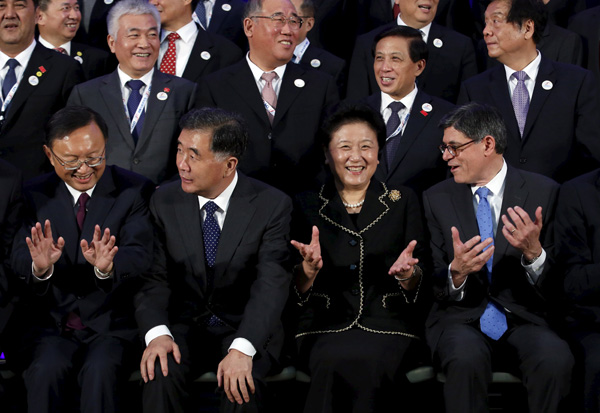
From left: Chinese State Councilor Yang Jiechi, vice-premiers Wang Yang and Liu Yandong, and US Treasury Secretary Jacob J. Lew participate in a group photo at the Strategic and Economic Dialogue at the State Department in Washington on Tuesday. YURI GRIPAS/REUTERS
China is undertaking structural reforms as path to balanced development, minister says
Finance Minister Lou Jiwei urged the United States to assume more responsibility for boosting the global economic recovery in line with its capacity as the world's largest economy.
"Currently, China contributes about 30 percent of global economic growth, while the United States contributes about 10 percent. As the world's largest economy, the US should take on more responsibilities," Lou told a news briefing on the sidelines of the seventh China-US Strategic and Economic Dialogue, which opened on Tuesday in Washington.
Lou urged the US to accelerate structural reform by saving and investing more, raising its labor participation rate, and then enhancing the savings rate.
"The US should have a proper mechanism to mobilize more savings to direct to investment. At the same time, we suggest that the US use the opportunities of greater fiscal space to increase investment in infrastructure," he said.
He said that quantitative easing and fiscal measures are short-term remedies, while implementing structural reform is the fundamental way to realize sustainable and balanced growth.
China is also undertaking structural reforms by abolishing many project-approval items, eradicating many government interventions in pricing, encouraging the free flow of production factors, and implementing taxation reforms, Lou said.
The two-day dialogue is an annual bilateral platform for the world's two largest economies to exchange ideas on a set of thorny issues such as trade and investment barriers, intellectual property rights protection and exchange rates.
US Treasury Secretary Jacob J. Lew said China needs to make the yuan's exchange rate more market-determined. China's push to have the yuan recognized by the International Monetary Fund was discussed, a Treasury official said after the day's sessions. Pursuit of that goal was driving China's financial overhaul, the official said.
Vice-Premier Wang Yang said that both sides have been "working hard to make dialogue productive", adding that it is important that the two countries discuss economic cooperation and manage differences between the two.
Wang said that differences in the economic relationship are natural, but continued dialogue is needed.